2023











I am pleased to share the Offices of the Inspector General’s 2023 Annual Report on Gaming Oversight, which details our ongoing endeavors to ensure integrity, transparency, and accountability within New York State’s thriving gaming industry.
This past spring, I had the pleasure and good fortune of gathering my entire staff for a two-day training conference that we chose to title “Off to the Races.” And for good reason – just two and a half years into our assumption of jurisdiction over the New York State Gaming Commission, the entirety of our investigative, legal, and audit staff have been trained in handling gaming-related complaints. And in addition to handling a record number of complaints, they’re taking what they’ve learned
Lucy Lang NYS Inspector Generallearned to the people on the casino floors, in the backstretches, and monitoring the online sportsbooks, by conducting over 30 in-person Corruption Awareness Training sessions at over 20 locations across the state for almost 300 Commission employees.

Along with facts and figures about the complaints we’ve received, how we’ve handled them, and a preview of issues we anticipate will keep us busy in 2024, this year’s report also includes a detailed review of the impact of the 2022 legalization of Mobile Sports Wagering (MSW) in New York State and our efforts to ensure its integrity.
As the gaming landscape continues to evolve, my office remains steadfast in its commitment to safeguarding the interests of New Yorkers through robust oversight. I hope you enjoy learning about our work.

The New York State Gaming Commission (Commission) regulates and provides oversight for charitable gaming, commercial casinos, Class Ill Indian gaming, video lottery gaming, horse racing and pari-mutuel wagering, the State Lottery, interactive fantasy sports, and mobile sports wagering (MSW). In order to ensure the absence of any self-dealing, conflict, or other fraud in the Commission’s execution of its responsibilities, the New York State Inspector General has specific statutory authority to receive and investigate complaints from any source regarding allegations of corruption, fraud, criminal activity, conflicts of interest or abuse in the Commission and to undertake proactive initiatives aimed at preventing, eliminating, and/or detecting such concerns.
The Commission, headquartered in Schenectady, maintains a physical presence at 11 horse tracks (four Thoroughbred and seven Harness), 20 casinos (seven Indian gaming, nine video lottery and four commercial), and five Lottery field offices throughout the State (including one Lottery field office at the Schenectady headquarters). As part of its oversight, the Commission is also responsible for licensing a wide range of operators and employees, including lottery retailers, and casino and racetrack employees, and has a bureau assigned to effectuate this function. As Commission personnel are located throughout the State, the Offices of the New York State Inspector General (OIG) endeavors to maintain its presence and accessibility by conducting outreach, including regular site visits to meet with Commission employees and operators, as well as conducting corruption awareness trainings.
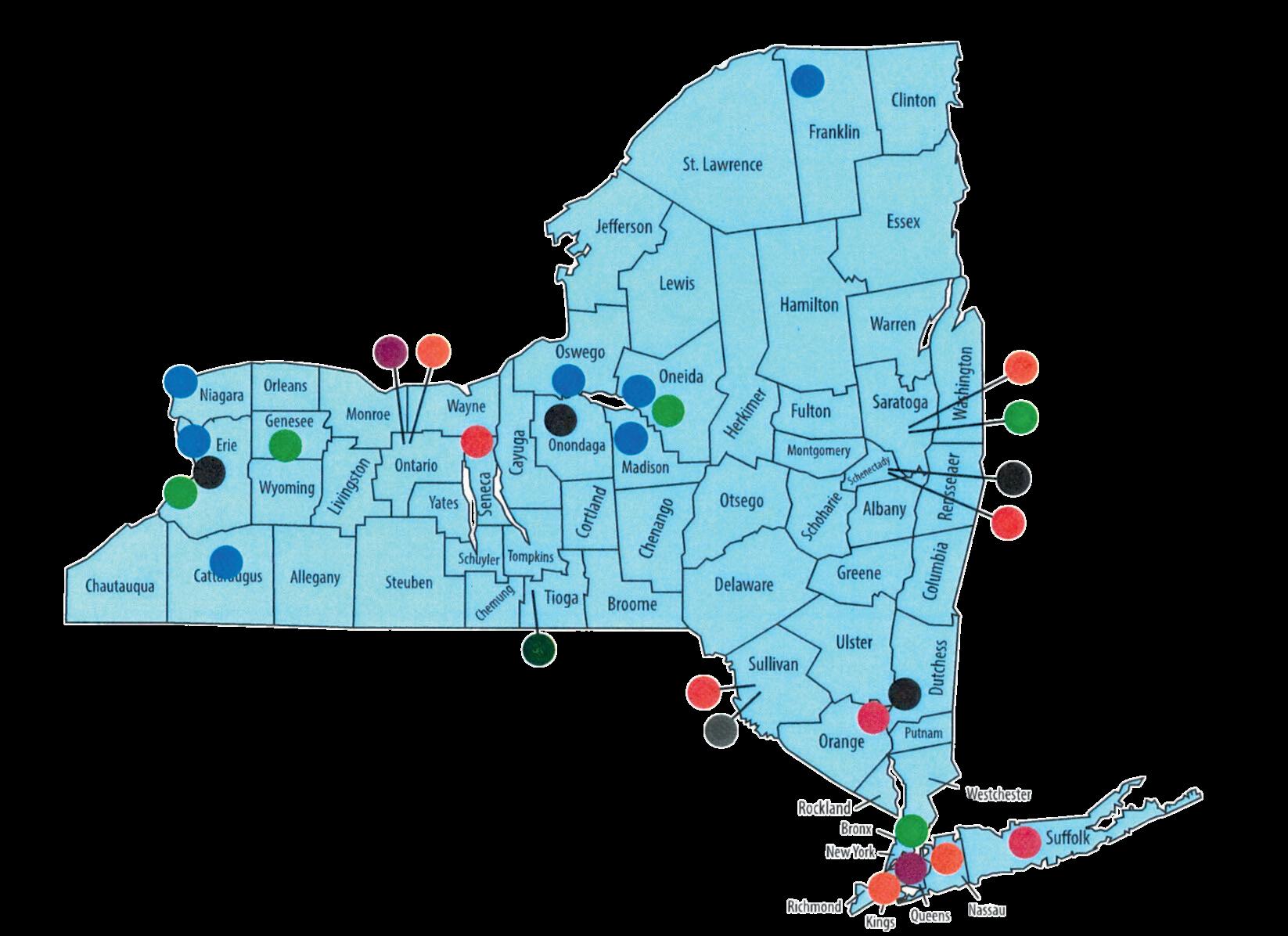
On January 8, 2022, New York’s gaming horizon was significantly broadened by the legalization of MSW. The past two years have yielded higher than anticipated tax revenues for the State, generating almost $35.3 billion in handle (amount wagered by bettors) and raising more than $1.5 billion in tax revenue for education.
In 2023, OIG continued its vigorous outreach and training efforts via in-person training of Commission employees, a dynamic social media campaign, and participation in community and recruitment events throughout the State. These efforts yielded a more than 20 percent increase in the number of gaming-related complaints received in 2023.
Many of these complaints were identified as being most appropriately reviewed by the Commission or a gaming operator’s customer support team and thus referred to the Commission. OIG investigations were opened into a number of matters, some of which are ongoing.
New York State Racing, Pari-Mutuel Wagering and Breeding Law (PML) §131(7) mandates that an annual report regarding OIG’s oversight of the Commission for the preceding calendar year be submitted to the Governor, State Comptroller, and Legislature. Accordingly, the Annual Report outlines some of the notable administrative and operational endeavors, outreach, and training conducted in furtherance of that mandate.
The Upstate New York Gaming Economic Development Act of 2013 was enacted for the purpose of creating jobs, increasing school aid, providing property tax relief, authorizing destination resort gaming, and consolidating the New York State Racing and Wagering Board and the Division of the Lottery into the Commission. The Commission regulates all legal gaming activity in the State, which includes horse racing, charitable gaming (e.g., bell jar, bingo, casino nights, and raffles), the Lottery, casinos (Indian, video lottery, and commercial gaming), interactive fantasy sports, and more recently, MSW.
The Legislature also determined that it was “essential to maintain the public confidence and trust in the credibility and integrity of legalized gaming activities,” and to that end, specifically created an Office of the Gaming Inspector General (OGIG). OGIG was tasked with investigating allegations of corruption, fraud, criminal activity, and conflicts of interests or abuse in the Commission; periodically reviewing and examining policies and procedures; making recommendations to combat corruption, fraud, criminal activity, and conflicts of interest or abuse; preparing and releasing to the public written reports of its investigations, as appropriate; referring, when necessary, its findings for disciplinary action or civil or criminal prosecution; establishing training programs; and liaising with other law enforcement organizations. The Commission and OGIG were officially formed on February 1, 2013.
In January 2021, then Governor Andrew M. Cuomo proposed “extract[ing] and segregat[ing] the Gaming Inspector General’s resources and authority from Gaming Commission resources” and transferring the operations of the former OGIG to OIG in order “to eliminate any potential conflicts of interests between the Gaming Commission and the Gaming Inspector General.” Chapter 59 of the Laws of 2021, effective June 18, 2021, modified the PML by transferring the duties and responsibilities of the former OGIG to OIG thereby increasing the personnel available to investigate gamingrelated complaints.
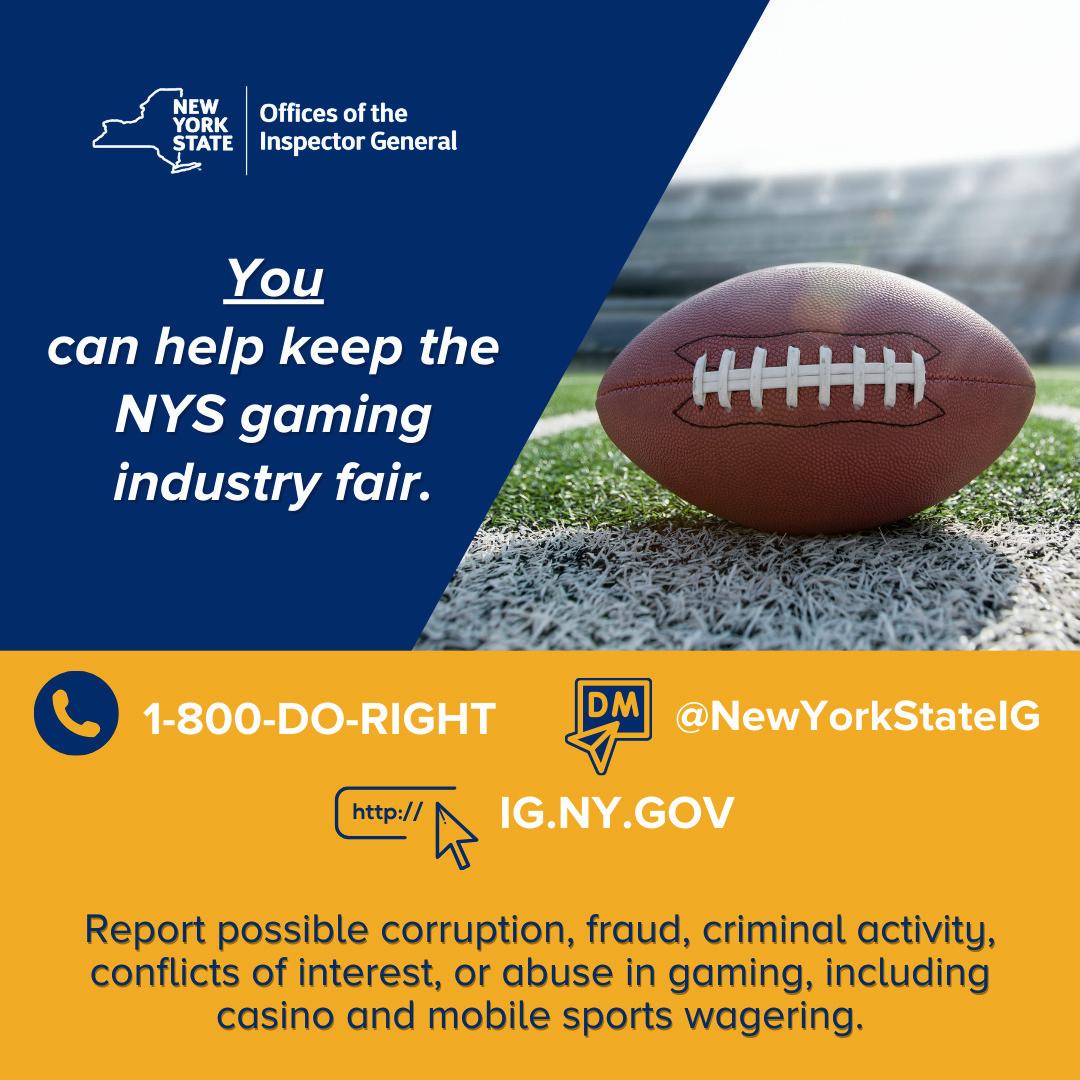
In 2023, OIG received 371 gaming-related complaints, an increase of more than 20 percent from the prior year. Complaints are received through multiple forms of communication, including hotline, telephone, email, mail, online complaint form, social media, and in person. OIG may also self-initiate a complaint for review. Complaints received in 2023 were derived from the following forms of communication:
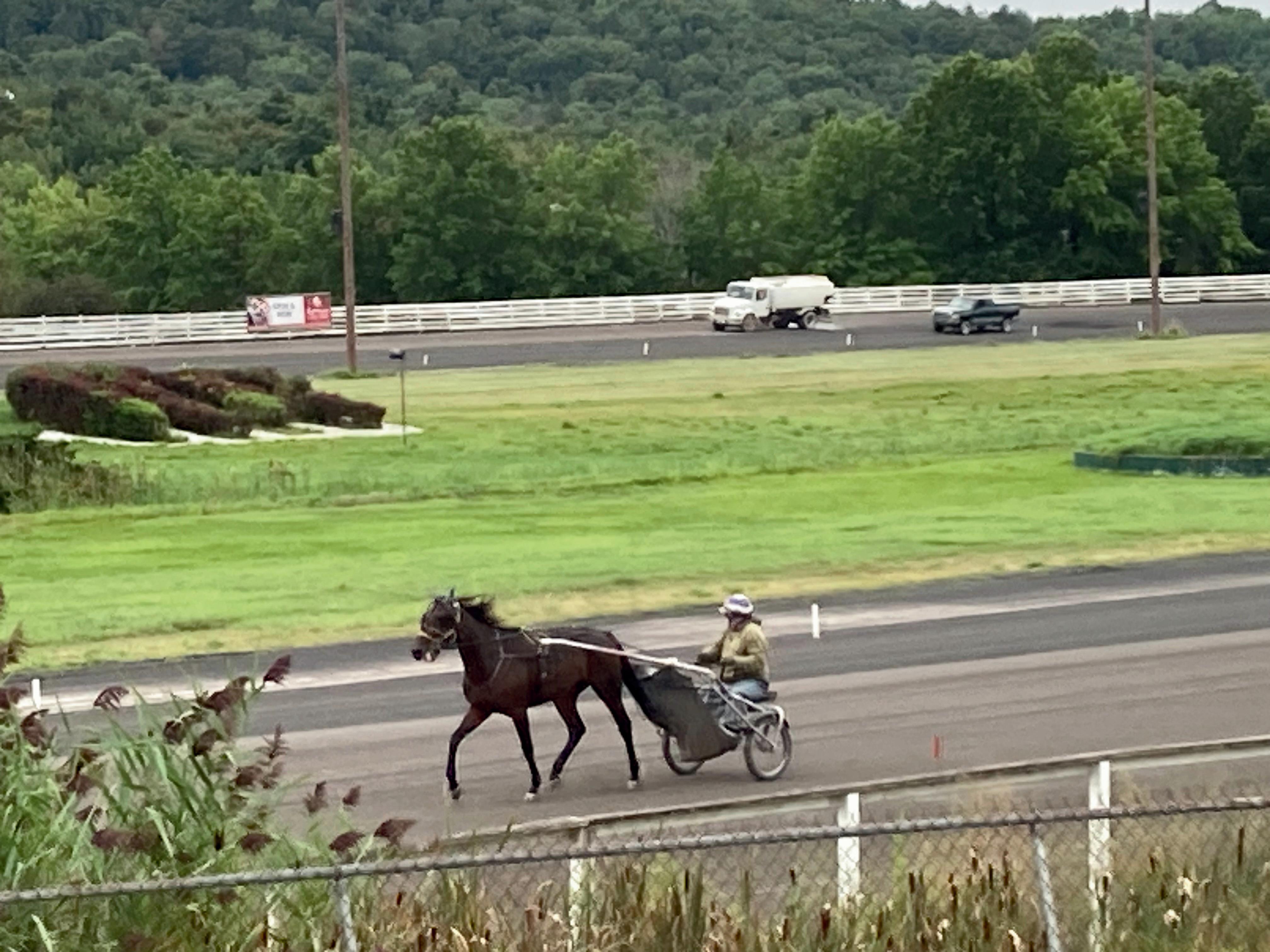
21% compared to 2022
150% compared to 2021
Social Media, OIG Staff, Fax, Walk-In
In general, complaints may be described as involving one of the following concerns:
Agency and Operational-Type Complaints
Including concerns about program, policy, or procedure issues like lack of staff or direction from management
Licensee or Vendor-Type Complaints
Including service-related issues raised by patrons such as account access problems or concerns about promotional offers
Employee-Type Complaints
Including individual behavior concerns such as time and attendance issues or favoritism
Inquiries
Non-traditional complaints but amount to requests for information
Miscellaneous-Type Complaints
These complaints either do not fit into the other categories or do not relate to OIG’s oversight of the Commission
The distribution of the types of complaints received in 2023 is as follows:
The review process for newly received gaming-related complaints is conducted in the same manner as all complaints received by OIG. On a weekly basis, a team of OIG leadership across all disciplines assembles to review and discuss the complaints received over the prior seven days. The details of each complaint are thoroughly evaluated to determine if the facts alleged establish a matter under OIG’s jurisdiction and if that matter warrants investigation by OIG, or if additional information is needed to make such a determination.
In the gaming context, many complaints involve facts that, even if accepted as true, constitute traditional Commission regulatory matters, such as vendor customer service disputes, rather than issues of problematic behavior within the Commission. Complaints such as these are referred back to the Commission for possible administrative action. Other complaints may be determined to be appropriate for referral to OIG’s law enforcement partners, or other government investigatory entities, or it may be determined that OIG lacks jurisdiction, or that there is no actionable complaint.

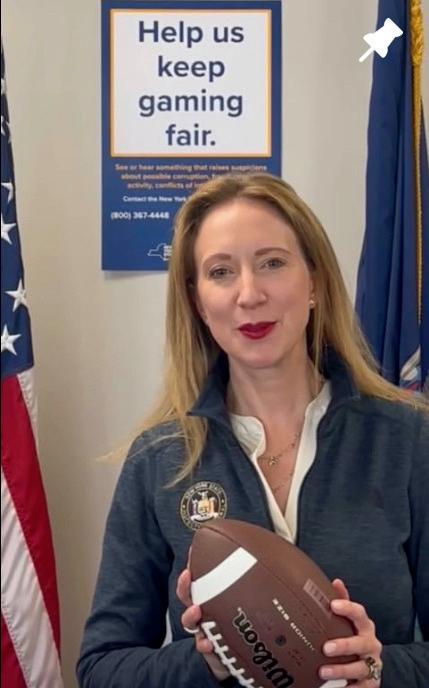
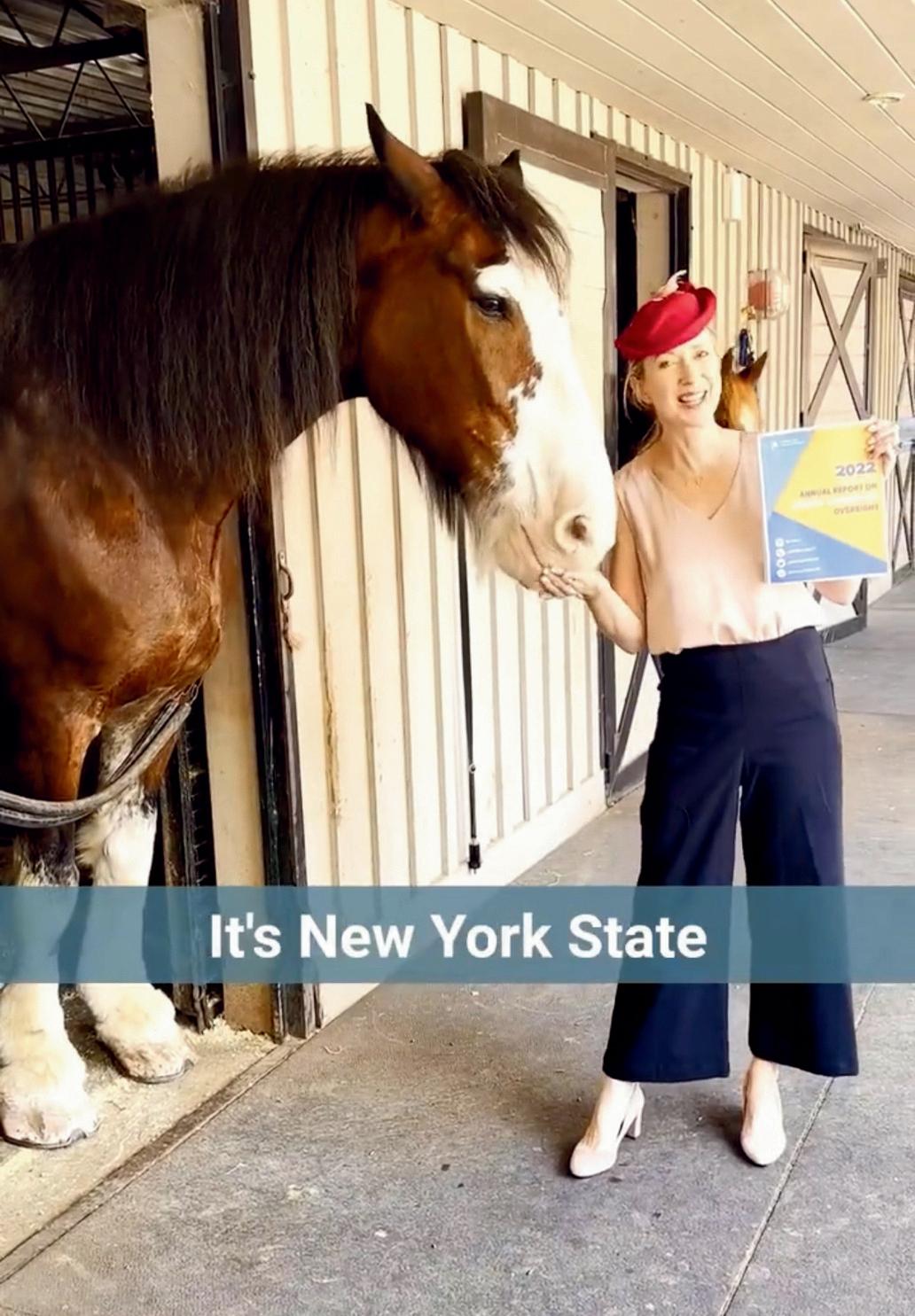



When an investigation is commenced, OIG assigns staff with the requisite skill set needed to ensure a comprehensive investigation. Thus, in most instances, multidisciplinary teams comprised of investigative counsels, investigators and auditors work collaboratively. Investigations may result in referrals to prosecutorial partners for criminal prosecution, to the Commission or other State agencies, such as the Office of Employee Relations AntiDiscrimination Investigations Division for administrative review and/or action, or to the Commission on Ethics and Lobbying in Government for action on ethics law violations.
OIG is also authorized to review and examine periodically the policies and procedures of the Commission, with regard to the prevention and detection of corruption, fraud, criminal activity, conflicts of interest or abuse, and to recommend remedial action to prevent or eliminate the same. These reviews may be prompted by complaints or commenced by OIG on its own initiative. Such a review into MSW was undertaken in 2023. As part of that effort, OIG reviewed the Commission’s implementation of MSW and its handling of MSW related complaints since its inception. The goal of this review was to determine whether bettors’ interests are adequately protected, complaints are sufficiently addressed, and if the Commission is fulfilling its mission to ensure that all lawful gaming conducted in the State is of the “highest integrity, credibility, and quality.” The MSW review provides an excellent example of this type of OIG investigation and its finding and attendant recommendations can be found later in this report.
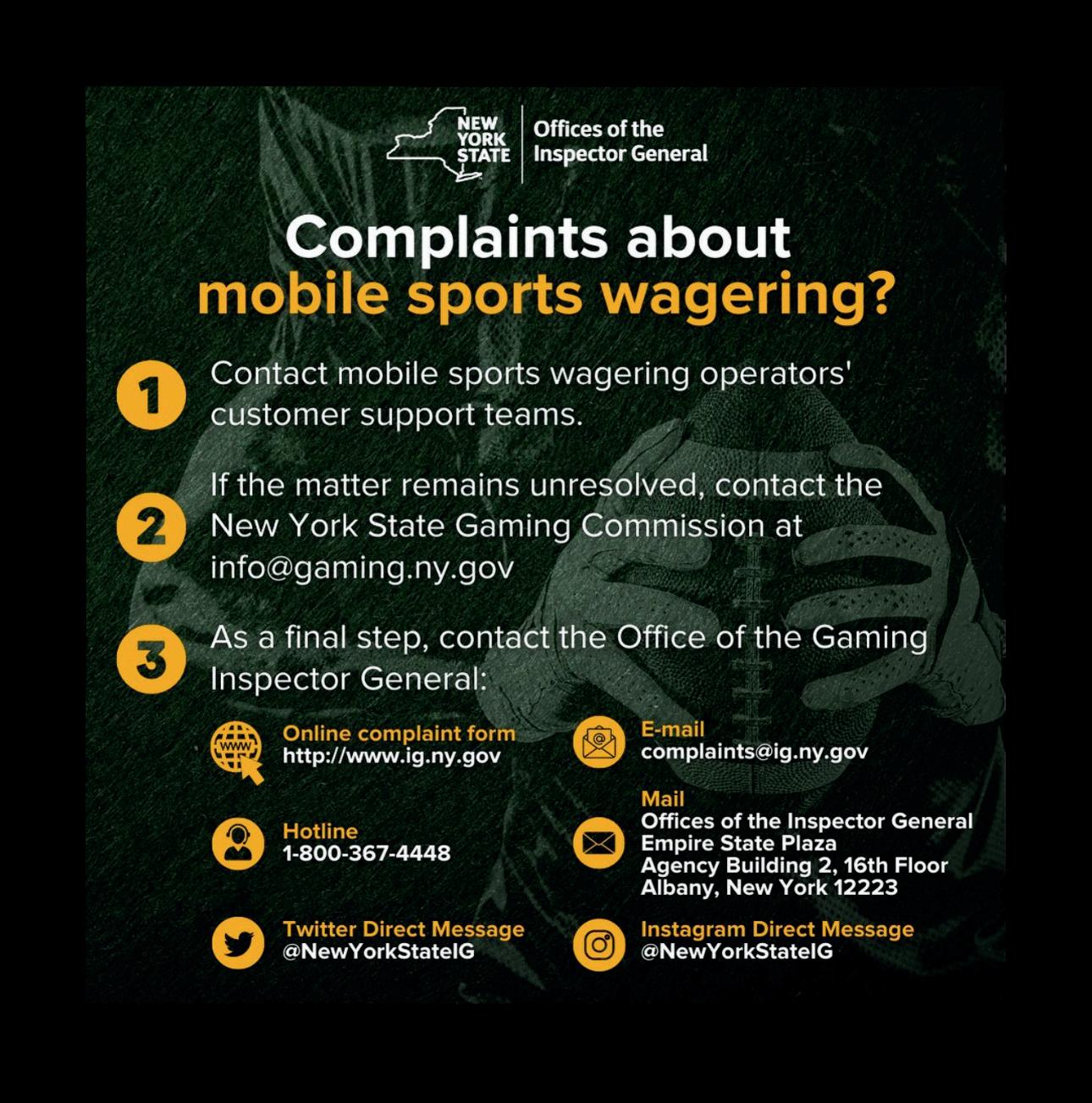
In 2023, OIG fulfilled its statutory mandate to provide Corruption Awareness Training to the hundreds of full-time, part-time, and per diem Commission employees assigned to 35 separate facilities throughout the State. Notably, the number of per diem staff fluctuates depending upon which racetracks are operational. In June 2023, when most racetracks were open, the Commission had approximately 445 full-time, part-time, and per diem employees in total, while at the close of 2023, there were approximately 397.
In 2023 OIG continued its robust training and outreach endeavors, conducting more than 31 in-person trainings at two dozen sites across the State. Through OIG’s training efforts, almost 300 full-time, part-time, and per diem Commission employees received OIG training. Notably, these training sessions are intended to serve the dual purpose of educating Commission staff on ethics issues and to increase awareness of OIG as a resource for receiving complaints and concerns.
Additionally, OIG staff attended more than a half-dozen in-person and virtual board meetings, including those of the Commission, the Agriculture & New York State Horse Breeding Development Fund, and the Gaming Facility Location Board.
In support of Governor Kathy Hochul’s pledge to promote transparency and accountability within government, and as a part of OIG’s own transparency plan, Inspector General Lang has released approximately 21 investigative reports and letters involving gaming for the period 2015 through 2023.
In 2023, OIG continued to utilize social media platforms to increase public awareness of its role in oversight of the Commission. In addition to regular postings on Instagram, Twitter, and LinkedIn regarding the role and work of OIG in the area of gaming, OIG has posted gaming specific messages and issued press releases on key dates relevant to the Commission’s work.
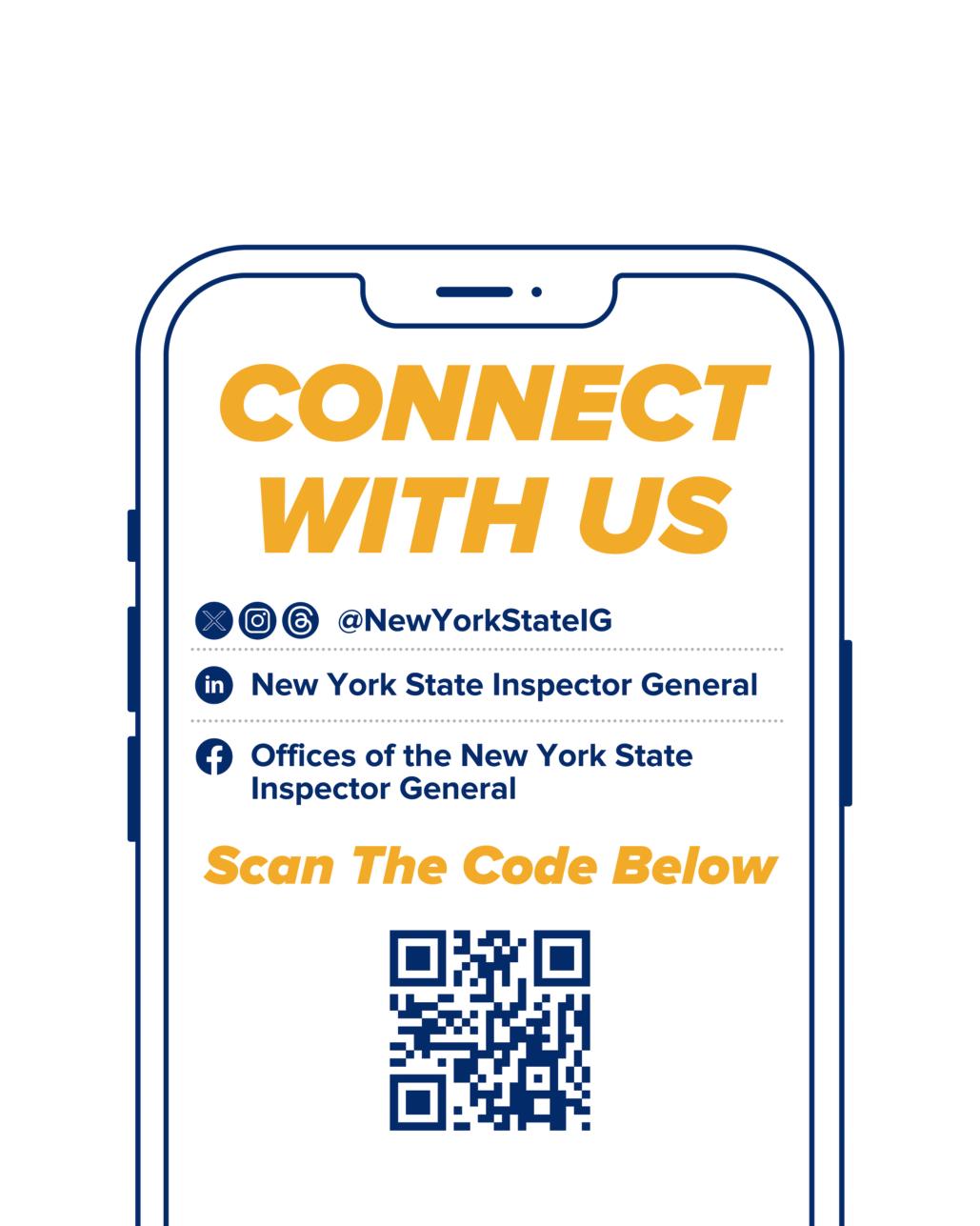
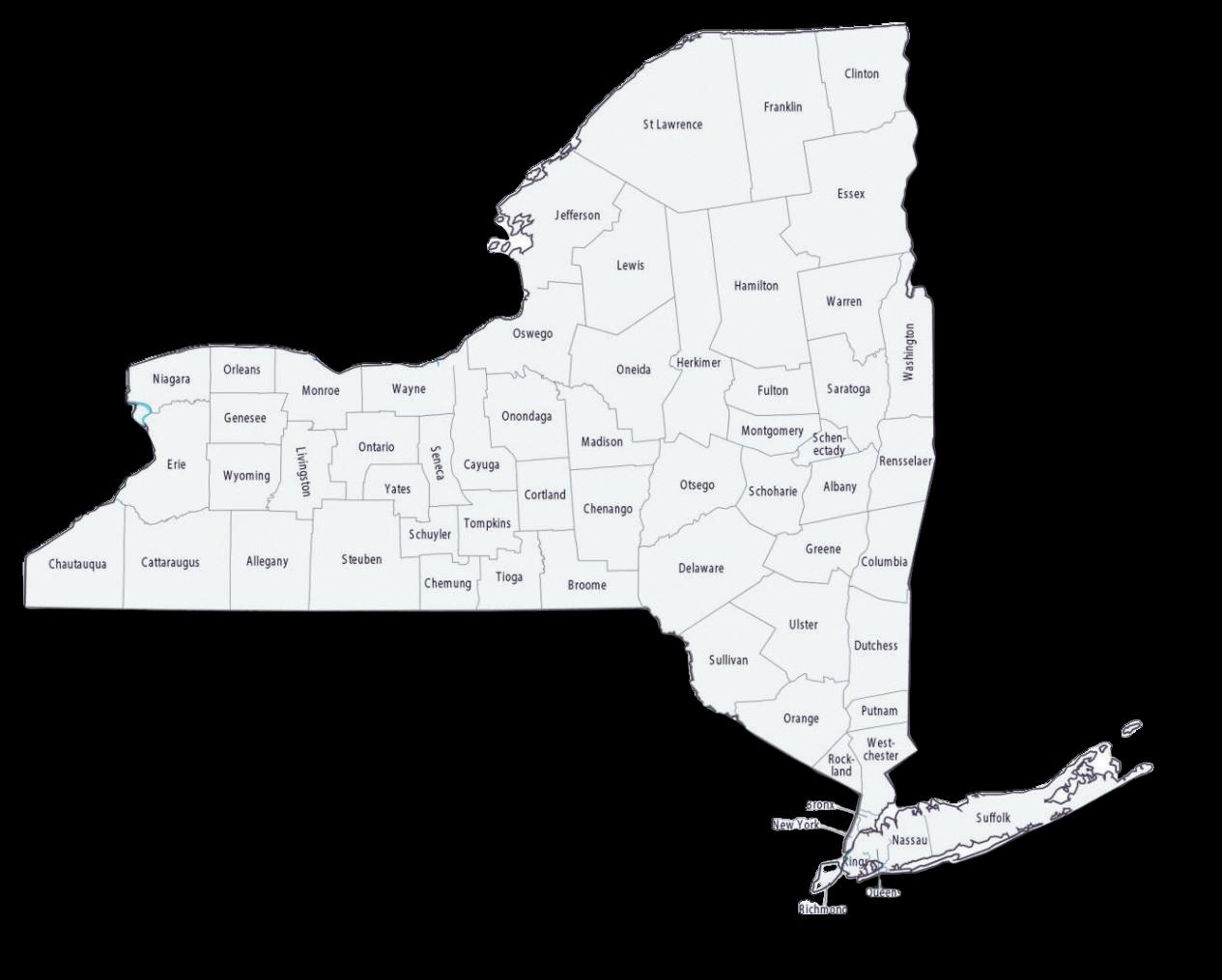
Saratoga Casino/Saratoga Harness
Saratoga Raceway
Monticello Raceway
Seneca Alleghany Casino
Finger Lakes Gaming & Racetrack
Batavia Downs Gaming
Resorts World Hudson Valley
Buffalo Lottery
Seneca Buffalo Creek Casino
Tioga Downs Casino/Tioga Racetrack
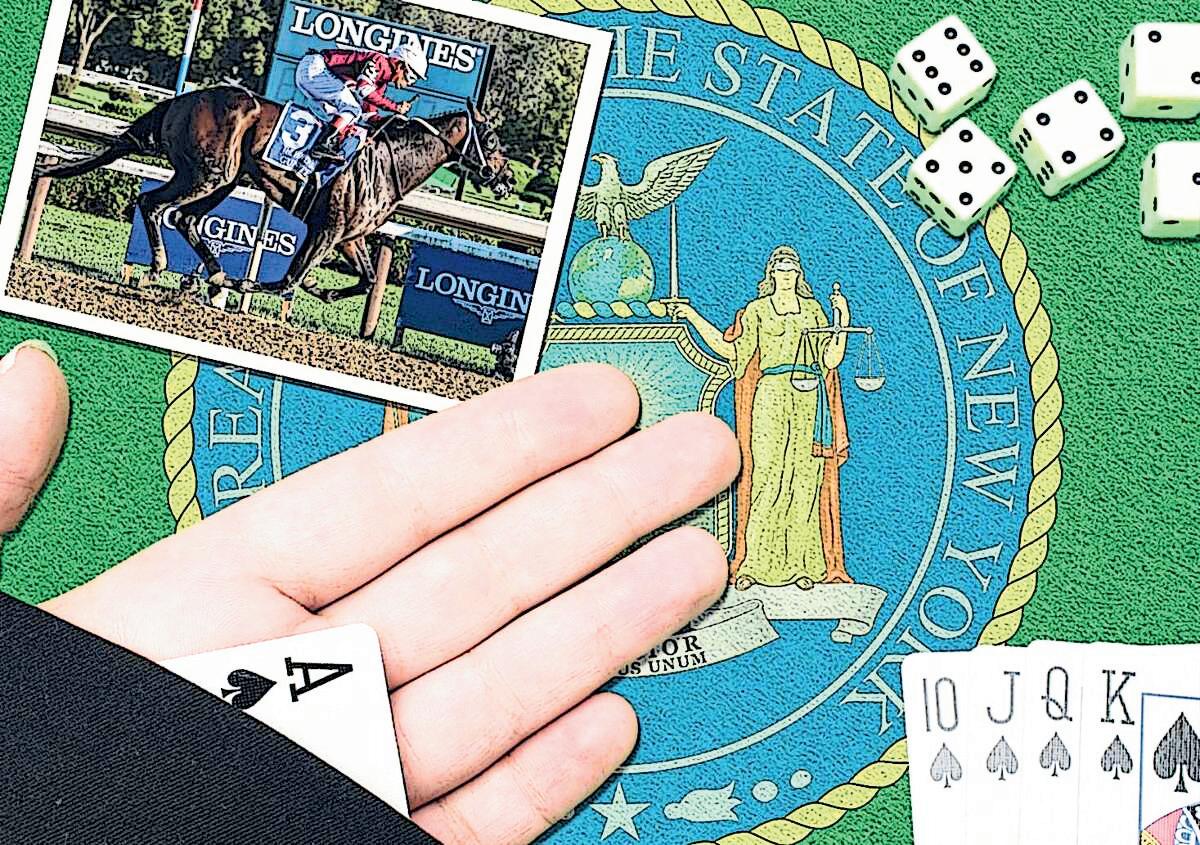
Point Place Casino
Syracuse Lottery
Resorts World Catskills
Vernon Downs Casino
Seneca Niagara Casino
Hamburg Gaming/Buffalo Raceway
Del Lago Casino
Jake's 58
Akwesasne Mohawk Casino
Empire City Casino/Yonkers Raceway
Schenectady - Main Office
On January 3, 2023, the Gaming Facility Location Board issued the Request for Applications (RFA) for three downstate commercial casino licenses. The Board also determined that the minimum investment by those seeking a license shall be no less than $500 million, with a $1 million application fee. The first round of Q&A was completed in August 2023 and the deadline to submit the second round of questions was in October 2023. To date, answers to the second round of questions have not been issued by the Commission. The review and evaluation of applications by the Board is expected to last until at least late 2024/early 2025. The local Community Advisory Committees will be constituted after applications have been received.
On March 22, 2022, the New York State Court of Appeals held that the law authorizing and regulating IFS contests is constitutional, in that, IFS does not constitute prohibited gambling. Accordingly, in October 2022, the Commission proposed rules and regulations relating to the activity and following the comment period, revisions were made. In March 2023, the Commission reproposed rules and regulations which were ultimately adopted in October of 2023. Relatedly, IFS operators with temporary permits were required to submit an Application for Registration by January 16, 2023, in order to continue its operations in the State. Also of note, in October 2023, the Commission adopted regulations that explicitly prohibit IFS operators from offering games that resemble proposition bets.



In the year ahead, OIG will continue its robust outreach and training program for Commission staff, as well as conduct regular site visits. In addition, OIG will continue to monitor legislative developments relevant to the Commission’s oversight, including downstate commercial casino licenses and problem gambling and responsible gaming.
Upon the Commission’s issuance of responses to the second round of Q&A, interested parties will have 30 days to submit their application and local Community Advisory Committees will be constituted. The Facility Location Board, however, cannot commence its review of an application unless the applicant has obtained the requisite Community Advisory Committee and zoning approvals, and paid the licensing fee. The review and evaluation of applications by the Board is expected to last until at least late 2024 or early 2025. The OIG will closely monitor this process to ensure that all rules, regulations, and statutory provisions are followed, and that the integrity of the process remains intact.
With the increase in gaming options for New York State residents, there has been heightened attention on problem gambling and responsible gaming for which a portion of gaming revenue is dedicated. Proposed legislation to include warnings about the potential harmful and addictive effects of gambling on mobile sports wagering advertisements currently remains with the Senate Racing, Wagering, and Gaming Committee. Moreover, OIG is actively planning a public forum on the issue later in 2024 with stakeholders from across the gaming spectrum.
The Horseracing Integrity and Safety Authority’s (HISA) Racetrack Safety Program went into effect on July 1, 2022, and its Anti-Doping and Medication Control program took effect on May 22, 2023. According to its website, HISA was “created to implement, for the first time, a national, uniform set of integrity and safety rules that are applied consistently to every Thoroughbred racing participant and racetrack facility.” In furtherance of this, HISA’s Racetrack Safety and Anti-Doping and Medication Control Standing Committees drafted rules and regulations governing thoroughbred racing to both enhance horse and rider safety and wellbeing and to ensure the integrity of the sport.
Although HISA’s Racetrack Safety and Anti-Doping and Medication Control programs are now fully operational, the Commission has not entered into any agreements with HISA regarding funding, use of State resources, or addressing standardbreds. As such, it is uncertain how these programs will impact the operations of the Commission’s Division of Racing or that of the New York Equine Drug Testing Program. Nevertheless, these developments do not prohibit the OIG from continuing to fulfill its statutory mandate and investigate allegations of corruption, fraud, criminal activity, conflicts of interest or abuse in the Commission and/or its vendors and licensees.
Given all the changes and gaming initiatives on the horizon, it will be crucial that OIG continue to increase its visibility with the general public, other law enforcement organizations, and of course, the Commission and its licensees and vendors. Hence, OIG will continue to aggressively conduct outreach and training, as well as diligently review complaints and conduct investigations into allegations of corruption, fraud, criminal activity, conflicts of interest or abuse within the Commission. Additionally, OIG has identified a number of proactive reviews to be undertaken, some of which are already underway with results expected later this calendar year. And, as always, OIG will continue to monitor trends in New York State gaming and train our investigatory staff on all emerging issues to effectively fulfill our statutory mandate.
In May 2018, the U.S. Supreme Court overturned the Professional and Amateur Sports Protection Act, which prohibited most states from legalizing sports wagering. Following this decision, New York State was free to establish regulations for sports wagering. In June 2019, the Commission adopted regulations for in-person sports wagering at commercial casinos, and in July 2019, the first in-person sportsbook opened.
In April 2021, then Governor Andrew Cuomo signed the fiscal year 2021-2022 budget bill authorizing MSW in the State. Akin to other gaming activity within New York State, the Commission was tasked with the responsibility of administering and regulating MSW. In furtherance of this, in July 2021, the Commission issued a RFA for MSW Platform Providers.11 In November 2021, the RFA Evaluation Committee issued its report and recommendations, and shortly thereafter, the Commission announced the applicants selected as platform providers and operators.
On January 6, 2022, the Commission announced that four operators—Caesars Sportsbook, DraftKings, FanDuel Sportsbook, and Rush Street Interactive also known as BetRivers—had been approved to commence MSW no earlier than January 8, 2022. And on January 8, 2022, the first mobile sports wager was made. Subsequently, an additional five operators were approved (BetMGM, PointsBet, WynnBet, ResortsWorld Bet, and Bally Bet), bringing the total to nine MSW operators.



Chapter 59 of the Laws of 2021 amended PML section 1367 and added section 1367-A to authorize MSW in the State. In sum, PML requires that such wagers be made via virtual or electronic means by a bettor physically present in New York, and transmitted and accepted by a server or other electronic equipment located at a commercial gaming facility within the State. The PML also imposes additional obligations upon the platform providers and operators, including, but not limited to: determining player eligibility (i.e., ensuring that excluded players and minors do not have access), account creation and management, financial transactions, handling of complaints, records retention, and annual plans and reporting (i.e., problem gambling plan, impact of MSW on problem gamblers, wagering data, etc.). Pursuant to the law, licenses are valid for up to 10 years.
Revenue generated from MSW is regularly transmitted to the Commission and deposits are made into statutorily mandated funds maintained by the Office of the New York State Comptroller (OSC). These funds are specifically set aside for the benefit of education and other statutorily designated purposes such as problem gambling and youth sports. The distribution and administration of these funds are undertaken by the New York State Education Department, Office of Addiction Services and Supports (OASAS), and Office of Children and Family Services (OCFS), respectively.
For the period January 2022 through December 2023, New York State’s MSW generated $35,296,084,495 in handle (total money wagered), resulting in $3,048,950,897 in gross gaming revenue (GGR). The operators are taxed at a rate of 51 percent of GGR, which yielded $1,554,965,539 in revenue for the State, funding education and other designated programs. For fiscal year 2021-2022, one percent, or approximately $1,600,000, was set aside to benefit sports for underserved youths. Similarly, one percent, or approximately $1,600,000, was allocated to support problem gambling education and treatment in fiscal year 2021-2022. In fiscal year 2022-2023, and thereafter, an annual allotment of $5,000,000 will be set aside for youth sports programs, and $6,000,000 for problem gambling programs.
$1,554,965,539
Notably, revenue generated by MSW has exceeded all estimates and expectations. The Commission’s monthly financial reports for MSW operators indicate that for 21 of the 24 months reviewed, MSW in the State generated in excess of one billion dollars in monthly handle. Moreover, for the last three months of 2023, over two billion dollars in handle was generated each month, potentially resulting in more funding for education than anticipated.
Although subject to fluctuation, the Inspector General undertook a comparison of the revenue generated by the nine MSW operators captured at two different periods in an effort to ascertain which operator had a larger presence in the market in the specified periods. This analysis is depicted in the table below.
The table below is a comparison of the operators once all nine became active.
As the two tables above and the pie chart below demonstrate, FanDuel and DraftKings maintain a significant percentage of the MSW market, with a combined GGR of 72.67 percent for January 2022 through December 2023, and 75.41 percent for July 2022 through December 2023. This is an important consideration when assessing the complaints received regarding the operators.
Gross Gaming Revenue (January 2022 - December 2023)

One of OIG’s top priorities is ensuring that all gaming activities conducted in the State are held to the highest standard of integrity and accountability. To that end, specific statutory provisions pertaining to the complaint process are included in the PML to assure transparency, fairness, and accountability of the operators and all stakeholders involved in MSW. By having a formalized complaint process, the wagering public has a forum to address concerns and report issues. Further, the Commission has the ability to learn of and respond to issues, investigate potential violations by operators, and take corrective action, if warranted, to protect the wagering public and maintain the integrity of MSW.
Accordingly, the PML and Commission regulations mandate that each operator prominently display its complaint process on the main page of its website. Operators are required to acknowledge to a complainant that they have received their complaint within 48 hours of receipt and provide a complete response to a complainant within ten business days. A complaint may also be filed against an operator with the Commission, and complaints against operators have been received by the Office of the New York State Attorney General (OAG) and OIG as well. Relatedly, the Commission may perform audits of an operator’s books and records and operators are obligated to cooperate with any investigation conducted by the Commission or law enforcement agencies.
As reported by the Commission to the New York State legislature in a January 2023 hearing, an overwhelming 97.3 percent of complaints received in the first year of MSW pertained to customer service issues with an operator—for which the Commission is not directly responsible. The Commission also reported that of these complaints, 98.13 percent were resolved by the operators to the Commission’s satisfaction.
OIG reviewed all MSW-related complaints received by the Commission from January 2022 through December 2023. During this period, the Commission reported receiving a total of 1,059 complaints from patrons and operators, or via referrals from the OAG or this Office. Complaints are generally received by e-mail, telephone, or from the respective agency websites.



A review of all MSW complaints received by the Commission revealed that an overwhelming majority pertained either to an account issue (i.e., creation, suspension, or withdrawals), the honoring of promotional offers, or wagers (i.e., restrictions or voids). Some raised multiple concerns while others involved multiple operators. Other less common complaints included wagering options, geo-comply issues (software used to verify the location of the person placing the mobile sports wager), or technical difficulties. A closer review of the complaints received in 2022 and 2023 revealed the following:
*Totalnumberofcomplaintsisgreaterassomecomplaintscontainmorethanoneissue.
As cited above, the Commission reported that nearly all complaints received in the first year of MSW were resolved agreeably and to the satisfaction of the Commission. However, OIG was unable to determine if complainants were timely provided a “complete response” within ten business days as set forth in PML. Although the Commission retains complaints and related correspondence regarding their resolution, it did not, nor does it currently, track the length of time it takes for each complainant to receive a complete response from an operator. Nevertheless, the Commission reports that based on its observations with the various operators, full responses were timely provided, and generally within several days.
Integrity is crucial to the success of gaming and directly impacts the amount of revenue generated to support education and fund other important endeavors such as youth sports and addressing problem gambling and treatment. To that end, the PML imposes upon operators many reporting mandates including, but not limited to the reporting of criminal or disciplinary proceedings against the casino or MSW licensee; unusual wagering activity or patterns; potential breaches of the relevant sports governing body’s internal rules or codes of conduct; any other conduct that corrupts a wagering outcome of an event, including match fixing; and suspicious or illegal wagering activities (money laundering, insider information, etc.). Additionally, the Commission has implemented anti-money laundering and currency transaction report regulations.
Operators must also enlist the services of an independent integrity monitor to analyze current wagering activities and trends and identify anomalies or other concerns to ensure that gaming is conducted fairly and without improper influence. The independent monitor collaborates with the Commission to share information and reports of suspicious activities, and address any concerns related to the integrity of MSW. Additionally, the Commission or the integrity monitor is required to report biannually to the governor and legislature regarding the effectiveness of existing statutory and regulatory controls to ensure that MSW is maintaining the highest level of integrity.
Notwithstanding the robust statutory and regulatory framework, the Commission relies on the operators and their contracted integrity monitor (currently all operators utilize the same monitoring service) to detect suspicious activities or patterns in wagering. Unlike other gaming divisions within the Commission, there is no internal investigatory arm dedicated to MSW despite the record-breaking revenue generated.
Although, pursuant to the PML, the New York State Police is tasked with assisting the Commission in conducting investigations of potential criminal activity involving “unusual wagering activity, match fixing, and other conduct that corrupts a wagering outcome,” there is no dedicated investigative Commission staff to conduct proactive reviews of MSW licensee and/or activities, including account related activities, gaming software, and/or gaming algorithms.
Relatedly, the Commission maintains a public database of all rulings issued in horse racing. However, the equivalent is not available for other areas of gaming for which the Commission is responsible, including MSW. The public disclosure of fines and violations serves to increase transparency as it informs the public of actions and decisions made by the Commission and enhances public trust in government. Further, it holds licensees accountable for their actions, serves as a deterrent, and encourages licensees to comply with laws and regulations. Equally important, the publication of fines and violations educates and informs the public about how licensees conduct their business and allows the public to make informed choices as to with whom they want to do business.
Accordingly, the Commission should consider if its regulatory role may be strengthened with the addition of personnel, the creation of a dedicated internal investigatory arm for MSW, and/or with establishing a publicly accessible database of all fines and violations issued against operators/licensees involved in MSW.
With the increase in gaming options and the advent of MSW, concerns regarding an uptick in problem gambling, especially among underage college students, have been widely reported. The ease of access on mobile platforms can contribute to addictive behavior, resulting in not only financial loss, but also potentially impacting relationships and mental health. Moreover, the convenience of MSW may increase the risk of excessive gambling as it allows for continuous compulsive behavior in the privacy of one’s home.
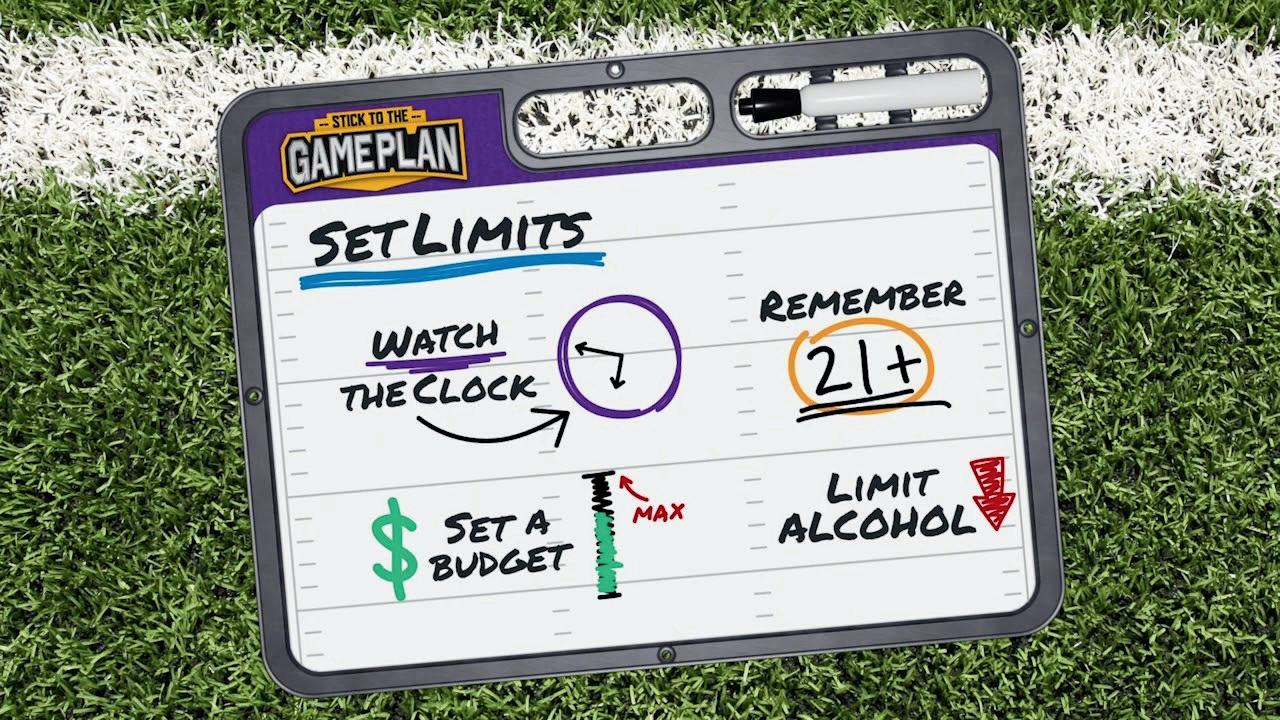
Advertising may also impact problem gambling in a number of ways, including repeated exposure of gambling opportunities to vulnerable individuals. This repeated exposure may also desensitize the public to the risks involved in gambling, which in turn may encourage impulsive behavior and entice individuals to gamble without thinking of the consequences or create unrealistic expectations of excitement or winning large sums of money. These risks may be greater for underage/college students as the advertisements not only make them aware of opportunities to gamble but may also increase their curiosity about the activity especially when it is depicted as fun and socially accepted.
The PML, in part, addresses these concerns as it requires operators to implement a series of processes to minimize the potential for problem gambling and its impact on vulnerable populations. Such processes include, but are not limited to: restricting bettors to only one account with each operator; voluntary self-exclusion or gaming limits for designated periods; requiring bettors to acknowledge when they have exceeded $2,500 in lifetime deposits with an operator and take certain steps before being permitted to continue wagering; prominently displaying information regarding problem gambling; maintaining a page dedicated to responsible play; having an annual problem gaming plan; prohibiting minors from wagering; and prohibiting advertisements that target minors, problem gamblers, or self-excluded individuals.
In addition to the statutory and regulatory framework, the Commission is also a member of the New York Responsible Play Partnership (Partnership) along with OASAS and the New York Council on Problem Gambling. The Partnership was formed to promote responsible gaming and raise awareness of problem gambling by providing a forum for discussions on best practices, treatment, and service options, and working to ensure that licensees are in compliance with problem gambling rules and regulations and inform the public of available resources. Moreover, as noted earlier, the Commission now allocates $6 million annually to support problem gambling education and treatment.

The Commission has implemented a regulatory scheme for MSW, which comports with its mission to ensure integrity and transparency. Rigorous licensing processes, statutory and regulatory mandates, geolocation technology, stringent data security measures, periodic penetration testing, and integrity monitoring are just some tools the Commission utilizes to achieve its goals. Nevertheless, the Commission should contemplate additional measures to strengthen its regulatory function including the addition of appropriate personnel or the creation of a dedicated internal investigatory unit for MSW, tracking the length of time it takes for MSW complainants to receive a complete response from an operator addressing their complaint, and establishing a publicly accessible database of all fines and violations issued against operators/licensees involved in MSW.






On November 29, 2021, Governor Kathy Hochul appointed Lucy Lang as the New York State Inspector General. On February 4, 2023, Ms. Lang was re-appointed as the New York State Inspector General for a term that runs conterminously with the current term of the Governor.

Effective June 18, 2021, the duties and responsibilities of the former Office of the Gaming Inspector General were transferred to and encompassed by the Offices of the New York State Inspector General. See Chapter 59 of the 2021 Laws of New York.

For calendar year 2023, there were six Lottery field office locations. However, on March 29, 2024, the Lottery field office located in Fishkill closed.

See Laws of New York, Chapter 60 of the Laws of 2012 §100.

See FY 2022 Executive Budget Briefing Book, Revenue Actions, Gaming Initiatives, “Decouple the Gaming Commission and the Gaming Inspector General,”





See, New York State Gaming Commission’s Mission Statement, https://www.gaming.ny.gov/about/#:~:text=The%20New%20York%20State%20Gaming%20 Commission%20regulates%20all%20aspects%20of,fantasy%20sports%2C%20and%20cha ritable%20gaming.
Most per diem staff are rehired for the next race meet, though each rehire must be submitted by the Commission and approved by the Governor’s Appointments Office and the Division of Budget.
See also Press Release, Inspector General Lucy Lang Releases Historical Horse Racing Investigations As Part Of Groundbreaking Transparency Initiative (Feb 11, 2022). https://www.ig.ny.gov/news/inspectr-general-lucy-lang-implements-transparencymeasures-increase-accountability-public.
See 9 NYCRR § 5329.37.
On December 27, 2020, the federal Horseracing Integrity and Safety Act was signed. See H.R. 1754 –116th Congress. Although HISA was initially scheduled to assume regulatory responsibility for horse racing nationwide on January 1, 2022, only its Racetrack Safety Program went into effect on July 1, 2022. HISA’s Racetrack Safety Rules can be found at https://www.budget.ny.gov/pubs/archive/fy22/ex/book/revenueactions.pdf, at 10.
https://hisaus.org/resources/racetrack-safety-rules. It’s Anti-Doping and Medication Control program was implemented the following year in May 2023.
I

https://hisaus.org/about-us.
See Murphy et al v. NCAA et al, 138 S. Ct. 1461 (2017). Sports wagering in Nevada, and sports lotteries in Oregon, Delaware, and Montana were exempt under the Act. I 11 G

I 13

G Of note, the Upstate New York Gaming Economic Development Act of 2013, which established destination resort gaming, prohibited sports wagering unless federal law changed to authorize such wagering or a court having jurisdiction ruled such activity lawful. See PML § 1301(39).

See https://www.gaming.ny.gov/pdf/Minutes%20June%2010%202019%20FINAL.pdf.

G See https://www.prnewswire.com/news-releases/rivers-casino--resort-schenectady-makeshistory-with-opening-of-new-sportsbook-lounge-300885902.html.

See Chapter 59 of the Laws of 2021; see also: https://www.nysenate.gov/legislation/bills/2021/A3009/amendment/original and https://www.governor.ny.gov/news/governor-cuomo-signs-fy-2022-budget-andannounces-continuation-middle-class-tax-cuts-help-new.

G See PML § 1367(2)(a). Section 1367, “Sports wagering,” is incorporated by reference into section 1367-A “Mobile sports wagering.” See PML § 1367-A(4)(j) (stating that “[a]ll mobile sports wagering shall be conducted in compliance with this section and section thirteen hundred sixty-seven of this title”).

I 19

See https://www.gaming.ny.gov/pdf/RFA%20Mobile%20Sports%20Wagering%20FINAL %20070 921.pdf.
G See https://www.gaming.ny.gov/pdf/Procurement/MSW%20Evaluation%20Committee %20Report%20&%20Recommendation%2011-01-21%20(redacted).pdf.

See https://www.gaming.ny.gov/pdf/RFA%20Mobile%20Sports%20Wagering%20 Application%20Licensee.pdf.
I 21 G See https://www.gaming.ny.gov/pdf/MSW%20Launch%20Statement%20010622.pdf.


See https://www.gaming.ny.gov/gaming/index.php. See also https://www.prnewswire.com /news-releases/caesars-sportsbook-debuts-mobile-sports-betting-in-new-york301456660.html; https://press.fanduel.com/press-releases/press-releasedetails/2022/FanDuel-Group-Bringing-Americas-1-Sportsbook-to-NewYork/default.aspx#:~:text=NEW%20YORK%2C%20Jan.,scheduled%20for%20Saturday%2C %20January%208; https://ir.rushstreetinteractive.com/news/news-details/2022/BetRiversto-Launch-Online-and-Mobile-Sportsbook-in-New-York-State-This-Saturday-MorningJanuary-8th/default.aspx; https://www.draftkings.com/news-2022-01-draftkings-set-tolaunch-mobile-sports-betting-in-new-york-on-saturday2.

G 22 See PML § 1367-A(4)(a).

G 24 23
BetMGM was approved on January 17, 2022; PointsBet on January 24, 2022; WynnBet on February 4, 2022; ResortsWorld Bet on March 3, 2022; and Bally Bet on July 8, 2022.
G See PML § 1367-A(2)(b). 25


G 26 Rhode Island and New Hampshire also tax MSW at a rate of 51 percent of GGR.


G See NYS Gaming Commission All Mobile Sports Wagering Operators Monthly Financial Report https://www.gaming.ny.gov/pdf/mobile/Monthly%20Mobile%20Sports%20Wagering %20Report%20Statewide.pdf. According to the Commission’s report, “Mobile Sports Betting in New York: A First Year Review & Its Budget Impact,” presented on January 31, 2023, to the legislature, MSW in its first full year generated $16,595,732,482 in handle, a total net revenue of $709,247,358 to education, and an additional $200 million in licensing fees, yielding more than $909 million in revenue to the State.
G OCFS Local Commissioners Memorandum dated May 3, 2022, states that $1,000,000 derived from the state tax imposed on MSW in its first fiscal year was the source of funding for Sports Opportunity Funding grants being offered. Similarly, OCFS Commissioners Memorandum dated January 18, 2023, states that $3,750,000 derived from the state tax imposed on MSW for the period of January 1, 2023, through September 30, 2023, was the funding source for grants being offered.

G
G 28 See https://www.governor.ny.gov/news/governor-hochul-announces-mobile-sportswagering-generated-909-million-new-york-state-first. See also https://www.osc.ny.gov/ press/releases/2023/10/dinapoli-mobile-sports-betting-adds-state-revenue-calls-problemgambling-hotline-rise-gaming. 29
















https://www.gaming.ny.gov/pdf/mobile/Monthly%20Mobile%20Sports%20Wagering%20Re port%20Statewide.pdf.
Of note, three of the nine operators commenced operations after January 2022.
G There was a $233 adjustment to revenue.
G
There was a $346 adjustment to revenue.
G Operations were commenced by WynnBet on February 4, 2022, ResortsWorld Bet on March 3, 2022, and Bally Bet on July 8, 2022.
See PML § 1367-A(4)(f).
See PML § 1367-A(4)(f) and section 5330.23(b) of Title 9 of the New York Code, Rules and Regulations.
However, Commission Regulations section 5329.23 requires that an in-casino sportsbook operator thoroughly investigate a complaint within five days.
G See PML § 1367(9).
§ 1367(12)(d).
Joint Public Hearing on Mobile Sports Betting in New York: A First Year Review & Its Budget Impact (January 31, 2023).
This review encompassed an analysis of the Commission’s MSW complaint log as well as correspondence from complainants regarding MSW to the Commission.
Of note, any dispute in excess of $5,000 requires the operator to notify the Commission. See 9 NYCRR 5329.23.
See PML § 1367(12)(e)(i)(1). See also 9 NYCRR § 5329.26.
G See PML § 1367(12)(e)(i)(2). See also 9 NYCRR § 5329.27(c).
See PML § 1367(12)(e)(i)(3).
I

G 46 47

G
See PML § 1367(12)(e)(i)(4).
See PML § 1367(12)(e)(i)(5).

G 48
See 9 NYCRR 5330.43 (9 NYCRR 5315.17 incorporated by reference).

49
See 9 NYCRR 5330.27 (5329.27 incorporated by reference); 5329.27 (obligation of operator to report suspicious wagering activity to an independent integrity monitor or the Commission if so directed.)

G 50

G See PML § 1367-A(6).
See PML § 1367(12)(a). In addition to MSW, the Division of Gaming is responsible for regulating and administering interactive fantasy sports, commercial casinos, Indian gaming, and video lottery terminal facilities with a staff of approximately eight assigned to its main office in Schenectady. 51

G 52

G See 9 NYCRR 4550.9(b).
See https://buffalonews.com/news/local/mobile-sports-betting-16-billion-business-in-ny-isdangerously-addictive-for-some/article_1a2f1626-6f7f-11ee-a69f-d78ab696da03.html; https ://time.com/6342504/gambling-addiction-sports-betting-college-students/; https:// www.vice.com/en/article/4a37mp/teens-are-developing-severe-gambling-problems-asonline-betting-surges. See also, Office of the New York State Comptroller report “Recent Impact of gaming Expansions on Revenues and Problem Gambling in New York” at p. 1012. (2023). https://www.osc.ny.gov/files/reports/pdf/impact-of-gaming-expansions-onrevenues-and-problem-gambling-in-ny.pdf.

See McGrane E, Wardle H, Clowes M, Blank L, Pryce R, Field M, Sharpe C, Goyder E 2023. What is the evidence that advertising policies could have an impact on gambling-related harms? A systematic umbrella review of the literature. The Royal Society for Public Health 215 (2023) 124-130. https://www.sciencedirect.com/science/article/pii/S003335062200342 0#:~:text=Some%20studies%20found%20links%20with,current%20and%20higher%20risk %20gamblers.

See PML § 1367-A(4)(a)(i).
See PML § 1367-A(4)(a)(xii). 55




See PML § 1367-A(4)(a)(xiv).
G See PML § 1367-A(4)(a)(xiii). G 56 57 G See PML § 1367-A(4)(a)(x). G 58 59

See PML § 1367-A(4)(a)(xv); 9 NYCRR 5330.34(b). G 60 61 G See PML § 1367-A(4)(a)(iii).


See PML §1367-A(4)(e); 9 NYCRR 5329.37; 9 NYCRR T 5330.45

See PML § 1367-A(4)(a).

G 62 63 G Records reflecting this tracking should be maintained by the Commission for internal controls and external program monitoring. G 64